QAB020N504S: Negotiation and Communication Report Analysis
VerifiedAdded on 2022/08/15
|7
|1790
|19
Report
AI Summary
This report provides a detailed analysis of a case study involving cross-cultural management, focusing on negotiation, communication, and ethical dilemmas within an organization operating in Tanzania. The report examines the challenges faced by a manager who attempted to integrate local cultural practices, highlighting conflicts with the company's established culture and values. It delves into issues of organizational culture, leadership, and ethical decision-making, particularly concerning nepotism and bribery. The analysis utilizes organizational culture theory and leadership principles to explain the problems. The report also includes a reflective section on group work, emphasizing the importance of communication, coordination, and shared responsibility within a team. It concludes with recommendations for ethical practices and strategies for improving future research and collaborative efforts.
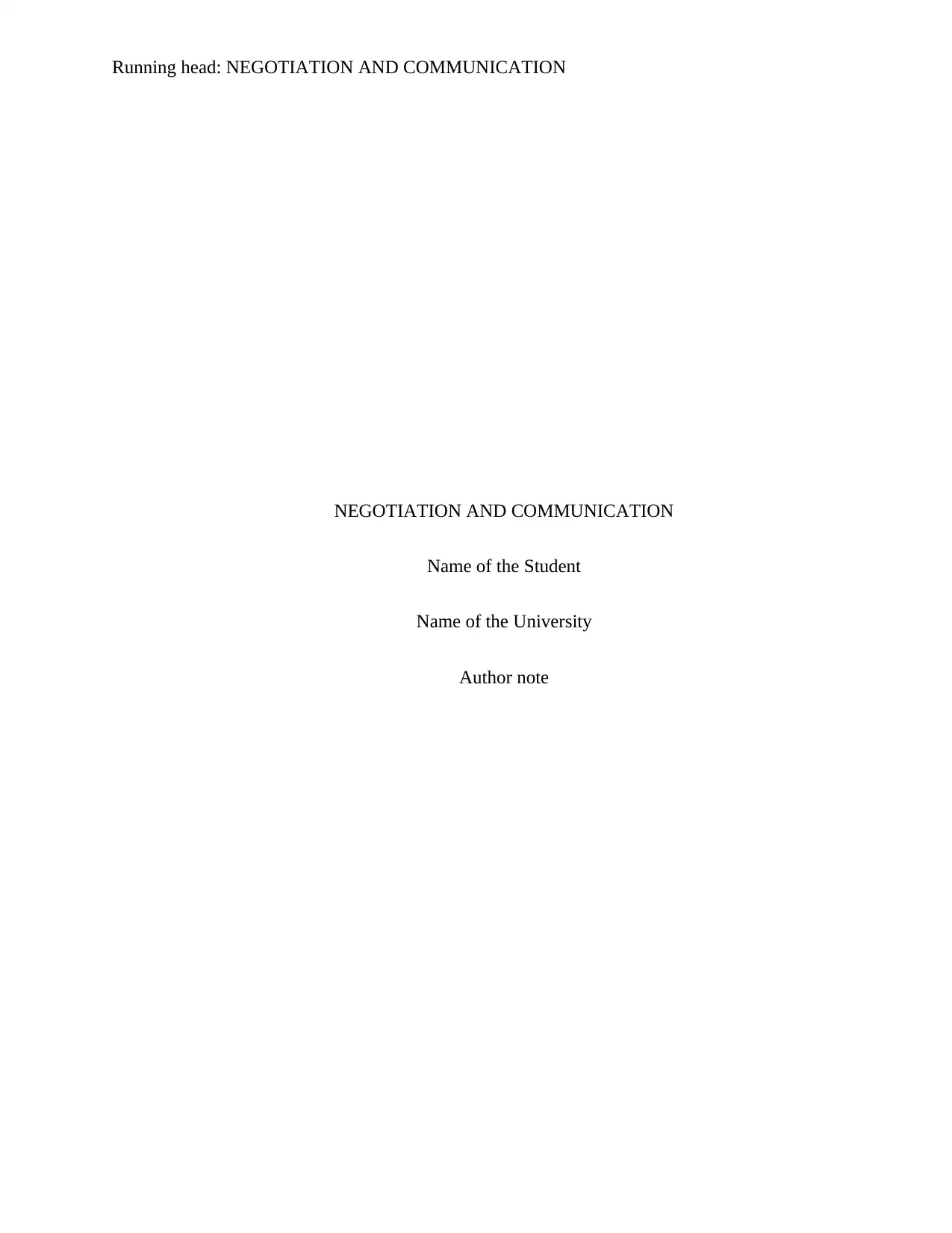
Running head: NEGOTIATION AND COMMUNICATION
NEGOTIATION AND COMMUNICATION
Name of the Student
Name of the University
Author note
NEGOTIATION AND COMMUNICATION
Name of the Student
Name of the University
Author note
Paraphrase This Document
Need a fresh take? Get an instant paraphrase of this document with our AI Paraphraser
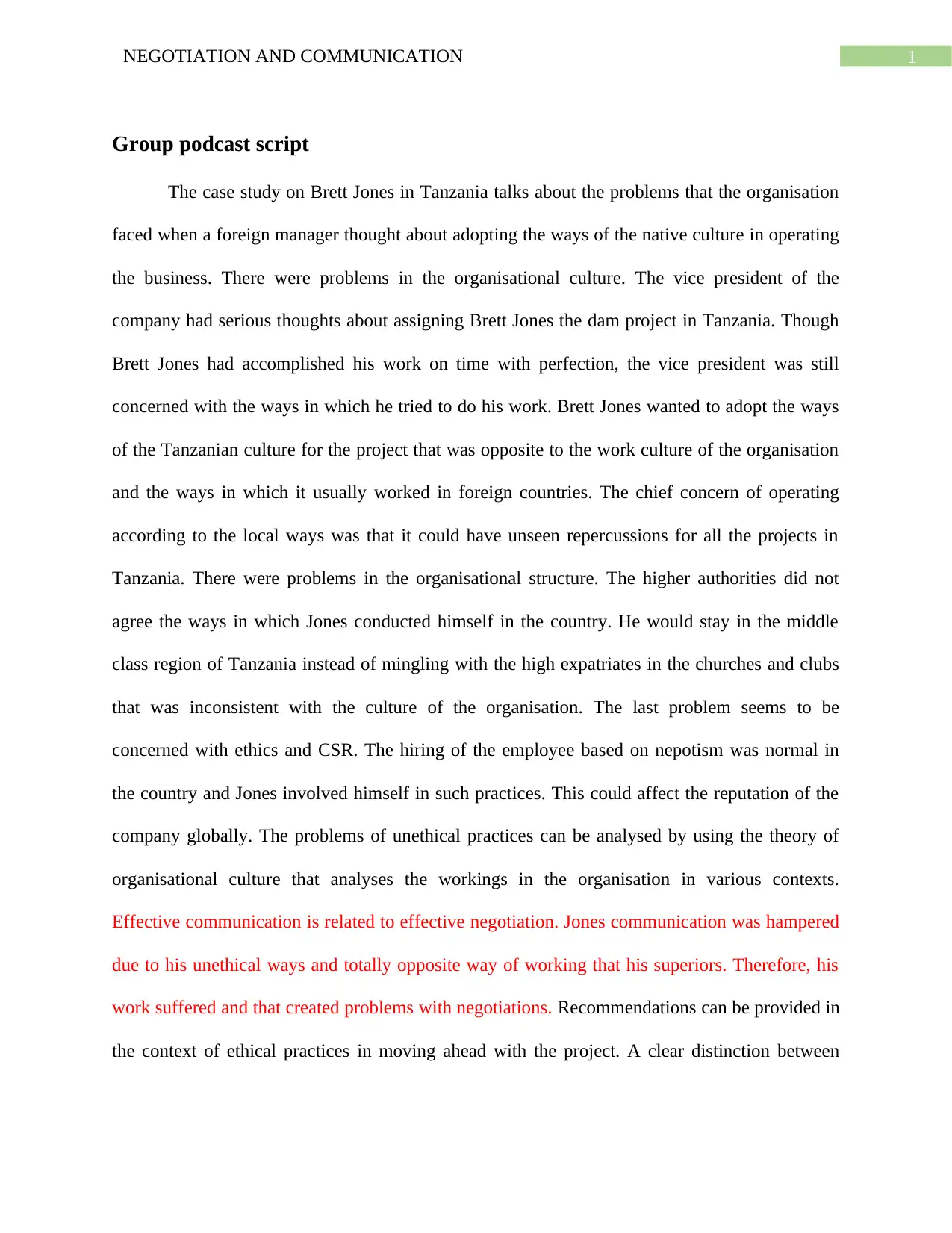
1NEGOTIATION AND COMMUNICATION
Group podcast script
The case study on Brett Jones in Tanzania talks about the problems that the organisation
faced when a foreign manager thought about adopting the ways of the native culture in operating
the business. There were problems in the organisational culture. The vice president of the
company had serious thoughts about assigning Brett Jones the dam project in Tanzania. Though
Brett Jones had accomplished his work on time with perfection, the vice president was still
concerned with the ways in which he tried to do his work. Brett Jones wanted to adopt the ways
of the Tanzanian culture for the project that was opposite to the work culture of the organisation
and the ways in which it usually worked in foreign countries. The chief concern of operating
according to the local ways was that it could have unseen repercussions for all the projects in
Tanzania. There were problems in the organisational structure. The higher authorities did not
agree the ways in which Jones conducted himself in the country. He would stay in the middle
class region of Tanzania instead of mingling with the high expatriates in the churches and clubs
that was inconsistent with the culture of the organisation. The last problem seems to be
concerned with ethics and CSR. The hiring of the employee based on nepotism was normal in
the country and Jones involved himself in such practices. This could affect the reputation of the
company globally. The problems of unethical practices can be analysed by using the theory of
organisational culture that analyses the workings in the organisation in various contexts.
Effective communication is related to effective negotiation. Jones communication was hampered
due to his unethical ways and totally opposite way of working that his superiors. Therefore, his
work suffered and that created problems with negotiations. Recommendations can be provided in
the context of ethical practices in moving ahead with the project. A clear distinction between
Group podcast script
The case study on Brett Jones in Tanzania talks about the problems that the organisation
faced when a foreign manager thought about adopting the ways of the native culture in operating
the business. There were problems in the organisational culture. The vice president of the
company had serious thoughts about assigning Brett Jones the dam project in Tanzania. Though
Brett Jones had accomplished his work on time with perfection, the vice president was still
concerned with the ways in which he tried to do his work. Brett Jones wanted to adopt the ways
of the Tanzanian culture for the project that was opposite to the work culture of the organisation
and the ways in which it usually worked in foreign countries. The chief concern of operating
according to the local ways was that it could have unseen repercussions for all the projects in
Tanzania. There were problems in the organisational structure. The higher authorities did not
agree the ways in which Jones conducted himself in the country. He would stay in the middle
class region of Tanzania instead of mingling with the high expatriates in the churches and clubs
that was inconsistent with the culture of the organisation. The last problem seems to be
concerned with ethics and CSR. The hiring of the employee based on nepotism was normal in
the country and Jones involved himself in such practices. This could affect the reputation of the
company globally. The problems of unethical practices can be analysed by using the theory of
organisational culture that analyses the workings in the organisation in various contexts.
Effective communication is related to effective negotiation. Jones communication was hampered
due to his unethical ways and totally opposite way of working that his superiors. Therefore, his
work suffered and that created problems with negotiations. Recommendations can be provided in
the context of ethical practices in moving ahead with the project. A clear distinction between
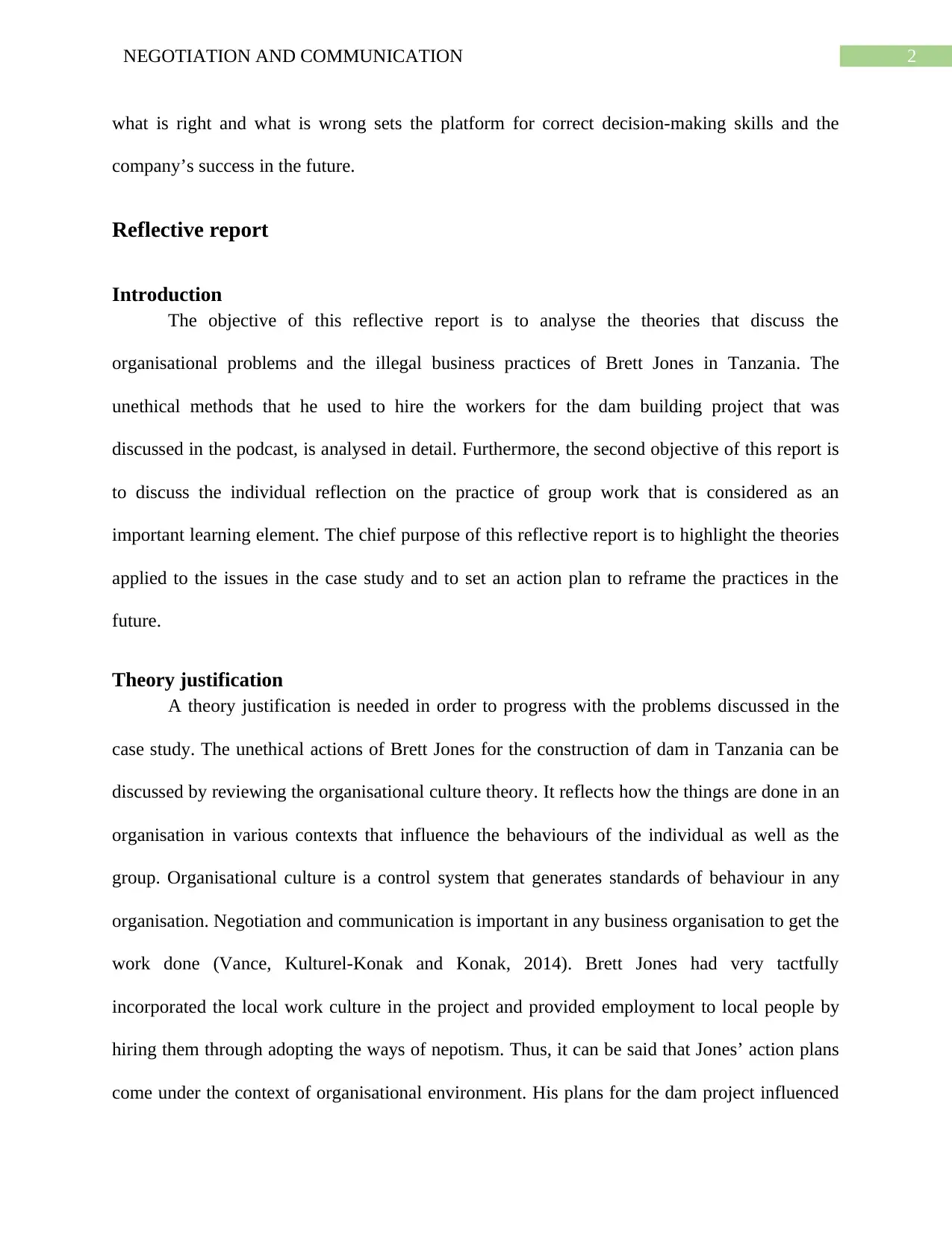
2NEGOTIATION AND COMMUNICATION
what is right and what is wrong sets the platform for correct decision-making skills and the
company’s success in the future.
Reflective report
Introduction
The objective of this reflective report is to analyse the theories that discuss the
organisational problems and the illegal business practices of Brett Jones in Tanzania. The
unethical methods that he used to hire the workers for the dam building project that was
discussed in the podcast, is analysed in detail. Furthermore, the second objective of this report is
to discuss the individual reflection on the practice of group work that is considered as an
important learning element. The chief purpose of this reflective report is to highlight the theories
applied to the issues in the case study and to set an action plan to reframe the practices in the
future.
Theory justification
A theory justification is needed in order to progress with the problems discussed in the
case study. The unethical actions of Brett Jones for the construction of dam in Tanzania can be
discussed by reviewing the organisational culture theory. It reflects how the things are done in an
organisation in various contexts that influence the behaviours of the individual as well as the
group. Organisational culture is a control system that generates standards of behaviour in any
organisation. Negotiation and communication is important in any business organisation to get the
work done (Vance, Kulturel-Konak and Konak, 2014). Brett Jones had very tactfully
incorporated the local work culture in the project and provided employment to local people by
hiring them through adopting the ways of nepotism. Thus, it can be said that Jones’ action plans
come under the context of organisational environment. His plans for the dam project influenced
what is right and what is wrong sets the platform for correct decision-making skills and the
company’s success in the future.
Reflective report
Introduction
The objective of this reflective report is to analyse the theories that discuss the
organisational problems and the illegal business practices of Brett Jones in Tanzania. The
unethical methods that he used to hire the workers for the dam building project that was
discussed in the podcast, is analysed in detail. Furthermore, the second objective of this report is
to discuss the individual reflection on the practice of group work that is considered as an
important learning element. The chief purpose of this reflective report is to highlight the theories
applied to the issues in the case study and to set an action plan to reframe the practices in the
future.
Theory justification
A theory justification is needed in order to progress with the problems discussed in the
case study. The unethical actions of Brett Jones for the construction of dam in Tanzania can be
discussed by reviewing the organisational culture theory. It reflects how the things are done in an
organisation in various contexts that influence the behaviours of the individual as well as the
group. Organisational culture is a control system that generates standards of behaviour in any
organisation. Negotiation and communication is important in any business organisation to get the
work done (Vance, Kulturel-Konak and Konak, 2014). Brett Jones had very tactfully
incorporated the local work culture in the project and provided employment to local people by
hiring them through adopting the ways of nepotism. Thus, it can be said that Jones’ action plans
come under the context of organisational environment. His plans for the dam project influenced
⊘ This is a preview!⊘
Do you want full access?
Subscribe today to unlock all pages.

Trusted by 1+ million students worldwide
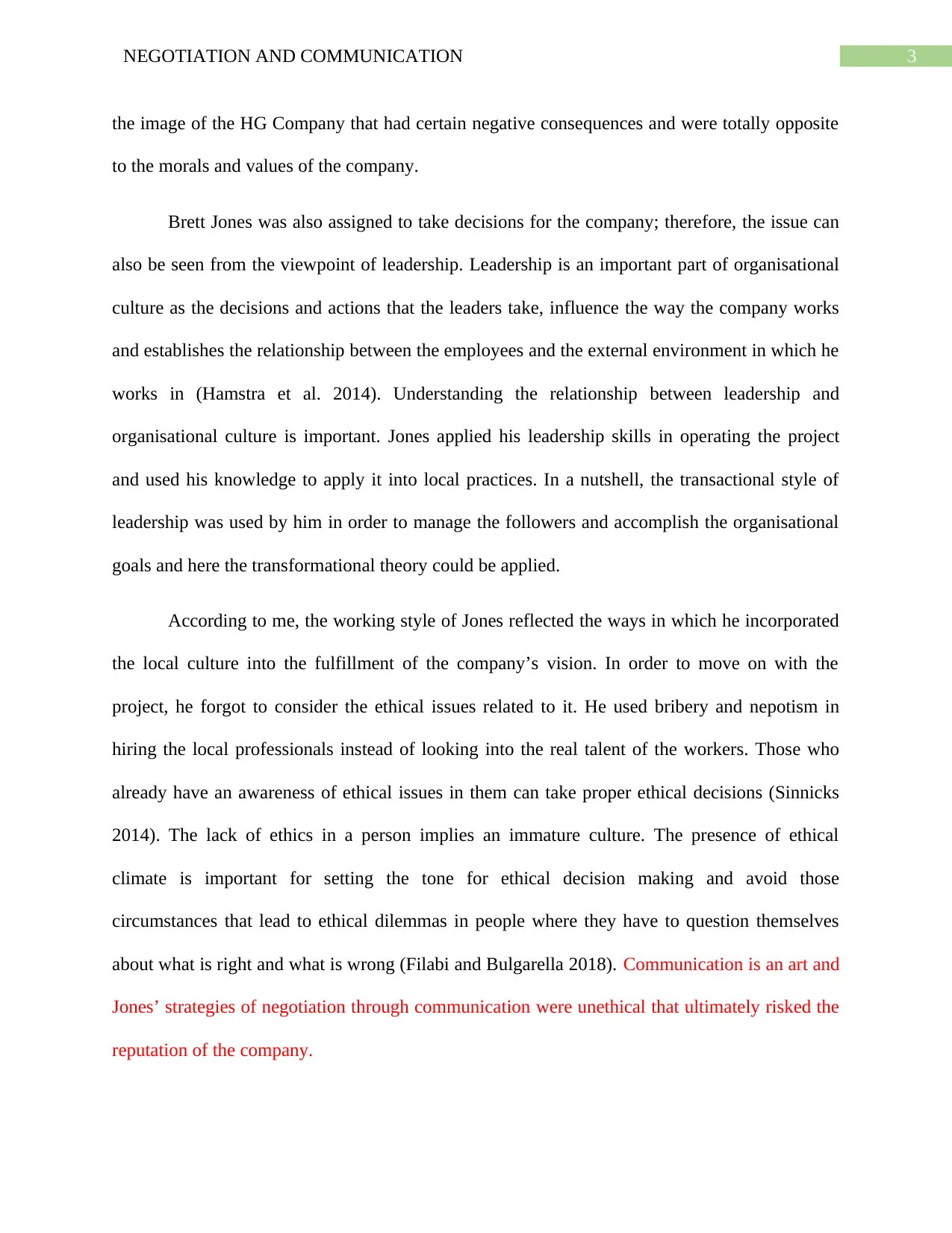
3NEGOTIATION AND COMMUNICATION
the image of the HG Company that had certain negative consequences and were totally opposite
to the morals and values of the company.
Brett Jones was also assigned to take decisions for the company; therefore, the issue can
also be seen from the viewpoint of leadership. Leadership is an important part of organisational
culture as the decisions and actions that the leaders take, influence the way the company works
and establishes the relationship between the employees and the external environment in which he
works in (Hamstra et al. 2014). Understanding the relationship between leadership and
organisational culture is important. Jones applied his leadership skills in operating the project
and used his knowledge to apply it into local practices. In a nutshell, the transactional style of
leadership was used by him in order to manage the followers and accomplish the organisational
goals and here the transformational theory could be applied.
According to me, the working style of Jones reflected the ways in which he incorporated
the local culture into the fulfillment of the company’s vision. In order to move on with the
project, he forgot to consider the ethical issues related to it. He used bribery and nepotism in
hiring the local professionals instead of looking into the real talent of the workers. Those who
already have an awareness of ethical issues in them can take proper ethical decisions (Sinnicks
2014). The lack of ethics in a person implies an immature culture. The presence of ethical
climate is important for setting the tone for ethical decision making and avoid those
circumstances that lead to ethical dilemmas in people where they have to question themselves
about what is right and what is wrong (Filabi and Bulgarella 2018). Communication is an art and
Jones’ strategies of negotiation through communication were unethical that ultimately risked the
reputation of the company.
the image of the HG Company that had certain negative consequences and were totally opposite
to the morals and values of the company.
Brett Jones was also assigned to take decisions for the company; therefore, the issue can
also be seen from the viewpoint of leadership. Leadership is an important part of organisational
culture as the decisions and actions that the leaders take, influence the way the company works
and establishes the relationship between the employees and the external environment in which he
works in (Hamstra et al. 2014). Understanding the relationship between leadership and
organisational culture is important. Jones applied his leadership skills in operating the project
and used his knowledge to apply it into local practices. In a nutshell, the transactional style of
leadership was used by him in order to manage the followers and accomplish the organisational
goals and here the transformational theory could be applied.
According to me, the working style of Jones reflected the ways in which he incorporated
the local culture into the fulfillment of the company’s vision. In order to move on with the
project, he forgot to consider the ethical issues related to it. He used bribery and nepotism in
hiring the local professionals instead of looking into the real talent of the workers. Those who
already have an awareness of ethical issues in them can take proper ethical decisions (Sinnicks
2014). The lack of ethics in a person implies an immature culture. The presence of ethical
climate is important for setting the tone for ethical decision making and avoid those
circumstances that lead to ethical dilemmas in people where they have to question themselves
about what is right and what is wrong (Filabi and Bulgarella 2018). Communication is an art and
Jones’ strategies of negotiation through communication were unethical that ultimately risked the
reputation of the company.
Paraphrase This Document
Need a fresh take? Get an instant paraphrase of this document with our AI Paraphraser
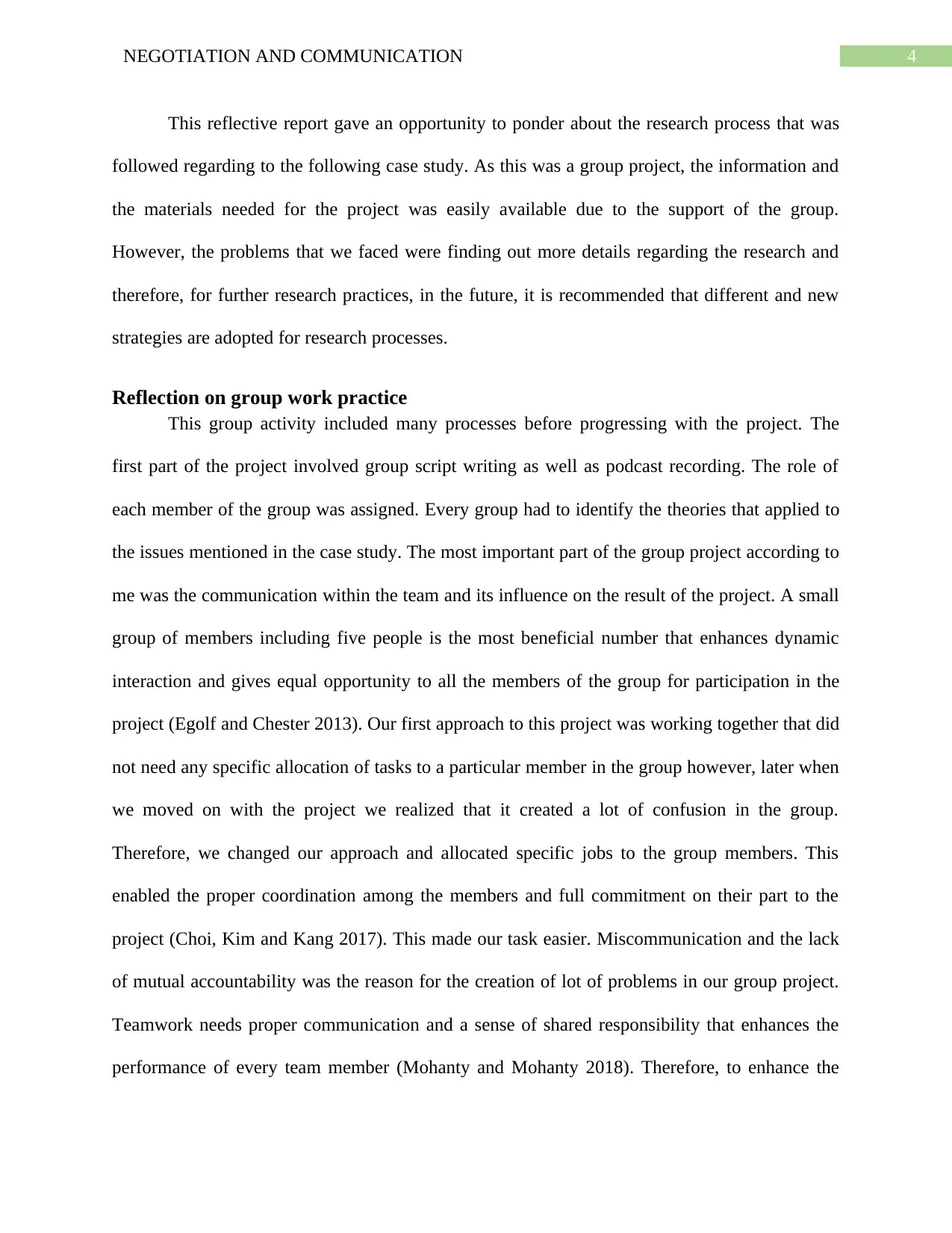
4NEGOTIATION AND COMMUNICATION
This reflective report gave an opportunity to ponder about the research process that was
followed regarding to the following case study. As this was a group project, the information and
the materials needed for the project was easily available due to the support of the group.
However, the problems that we faced were finding out more details regarding the research and
therefore, for further research practices, in the future, it is recommended that different and new
strategies are adopted for research processes.
Reflection on group work practice
This group activity included many processes before progressing with the project. The
first part of the project involved group script writing as well as podcast recording. The role of
each member of the group was assigned. Every group had to identify the theories that applied to
the issues mentioned in the case study. The most important part of the group project according to
me was the communication within the team and its influence on the result of the project. A small
group of members including five people is the most beneficial number that enhances dynamic
interaction and gives equal opportunity to all the members of the group for participation in the
project (Egolf and Chester 2013). Our first approach to this project was working together that did
not need any specific allocation of tasks to a particular member in the group however, later when
we moved on with the project we realized that it created a lot of confusion in the group.
Therefore, we changed our approach and allocated specific jobs to the group members. This
enabled the proper coordination among the members and full commitment on their part to the
project (Choi, Kim and Kang 2017). This made our task easier. Miscommunication and the lack
of mutual accountability was the reason for the creation of lot of problems in our group project.
Teamwork needs proper communication and a sense of shared responsibility that enhances the
performance of every team member (Mohanty and Mohanty 2018). Therefore, to enhance the
This reflective report gave an opportunity to ponder about the research process that was
followed regarding to the following case study. As this was a group project, the information and
the materials needed for the project was easily available due to the support of the group.
However, the problems that we faced were finding out more details regarding the research and
therefore, for further research practices, in the future, it is recommended that different and new
strategies are adopted for research processes.
Reflection on group work practice
This group activity included many processes before progressing with the project. The
first part of the project involved group script writing as well as podcast recording. The role of
each member of the group was assigned. Every group had to identify the theories that applied to
the issues mentioned in the case study. The most important part of the group project according to
me was the communication within the team and its influence on the result of the project. A small
group of members including five people is the most beneficial number that enhances dynamic
interaction and gives equal opportunity to all the members of the group for participation in the
project (Egolf and Chester 2013). Our first approach to this project was working together that did
not need any specific allocation of tasks to a particular member in the group however, later when
we moved on with the project we realized that it created a lot of confusion in the group.
Therefore, we changed our approach and allocated specific jobs to the group members. This
enabled the proper coordination among the members and full commitment on their part to the
project (Choi, Kim and Kang 2017). This made our task easier. Miscommunication and the lack
of mutual accountability was the reason for the creation of lot of problems in our group project.
Teamwork needs proper communication and a sense of shared responsibility that enhances the
performance of every team member (Mohanty and Mohanty 2018). Therefore, to enhance the
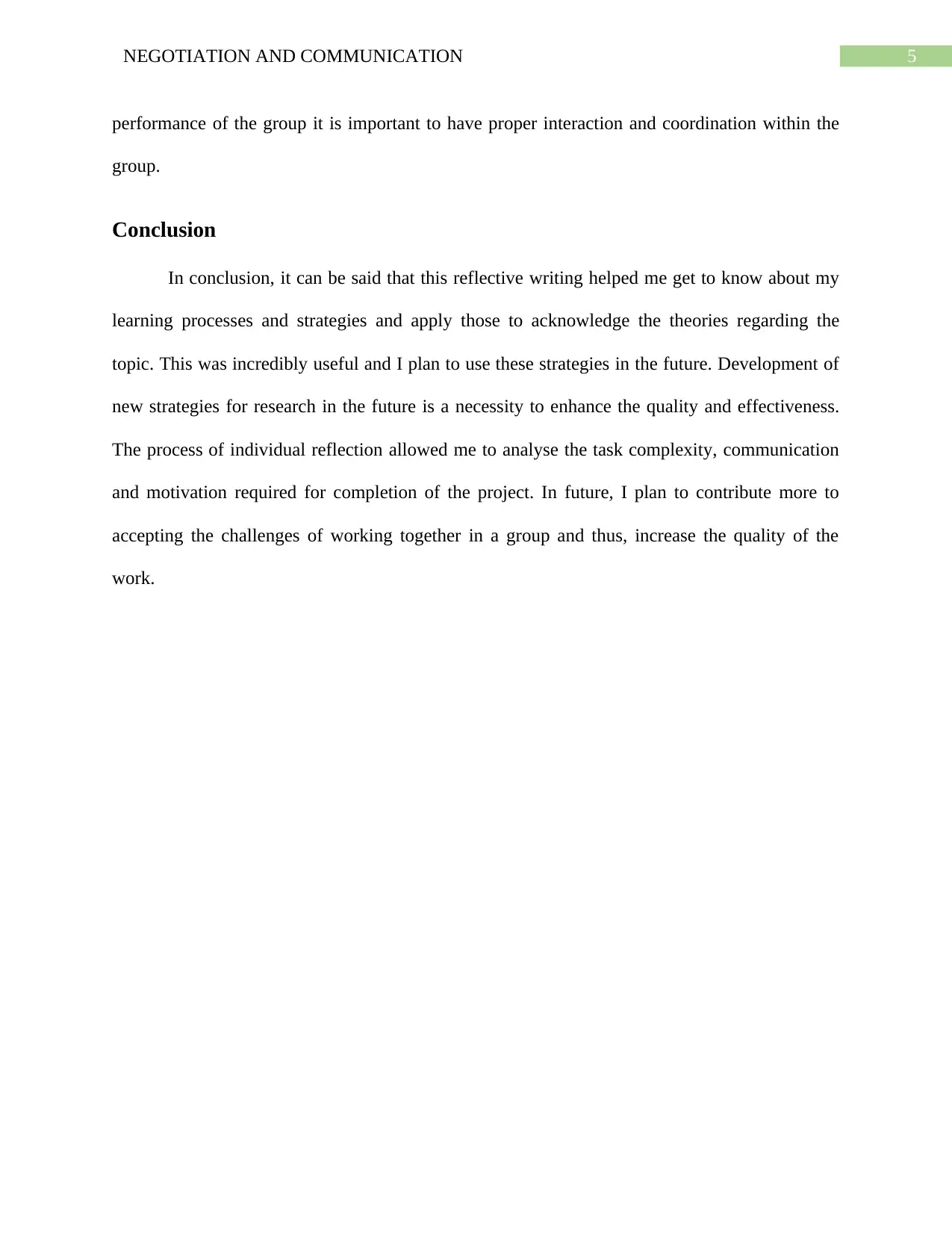
5NEGOTIATION AND COMMUNICATION
performance of the group it is important to have proper interaction and coordination within the
group.
Conclusion
In conclusion, it can be said that this reflective writing helped me get to know about my
learning processes and strategies and apply those to acknowledge the theories regarding the
topic. This was incredibly useful and I plan to use these strategies in the future. Development of
new strategies for research in the future is a necessity to enhance the quality and effectiveness.
The process of individual reflection allowed me to analyse the task complexity, communication
and motivation required for completion of the project. In future, I plan to contribute more to
accepting the challenges of working together in a group and thus, increase the quality of the
work.
performance of the group it is important to have proper interaction and coordination within the
group.
Conclusion
In conclusion, it can be said that this reflective writing helped me get to know about my
learning processes and strategies and apply those to acknowledge the theories regarding the
topic. This was incredibly useful and I plan to use these strategies in the future. Development of
new strategies for research in the future is a necessity to enhance the quality and effectiveness.
The process of individual reflection allowed me to analyse the task complexity, communication
and motivation required for completion of the project. In future, I plan to contribute more to
accepting the challenges of working together in a group and thus, increase the quality of the
work.
⊘ This is a preview!⊘
Do you want full access?
Subscribe today to unlock all pages.

Trusted by 1+ million students worldwide
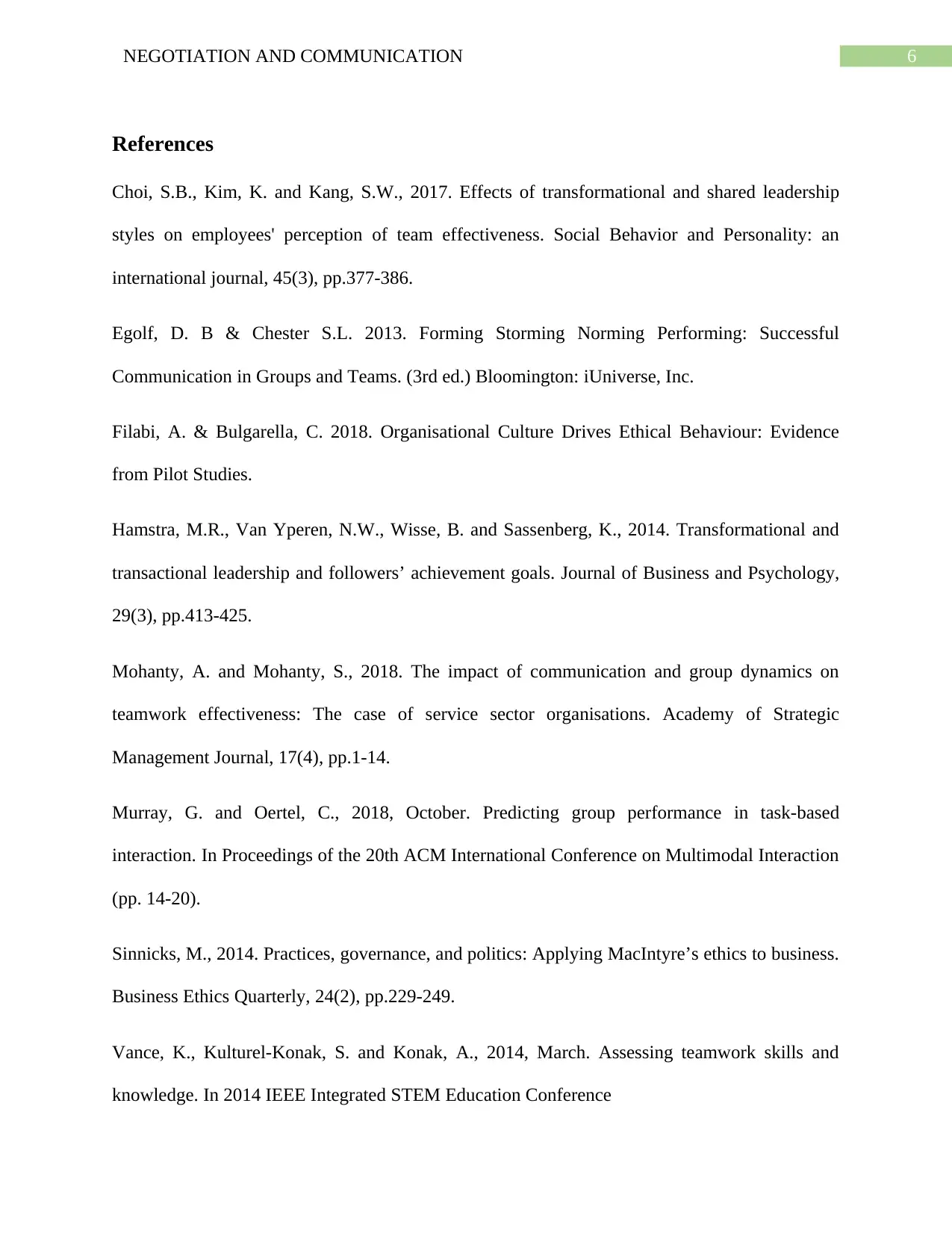
6NEGOTIATION AND COMMUNICATION
References
Choi, S.B., Kim, K. and Kang, S.W., 2017. Effects of transformational and shared leadership
styles on employees' perception of team effectiveness. Social Behavior and Personality: an
international journal, 45(3), pp.377-386.
Egolf, D. B & Chester S.L. 2013. Forming Storming Norming Performing: Successful
Communication in Groups and Teams. (3rd ed.) Bloomington: iUniverse, Inc.
Filabi, A. & Bulgarella, C. 2018. Organisational Culture Drives Ethical Behaviour: Evidence
from Pilot Studies.
Hamstra, M.R., Van Yperen, N.W., Wisse, B. and Sassenberg, K., 2014. Transformational and
transactional leadership and followers’ achievement goals. Journal of Business and Psychology,
29(3), pp.413-425.
Mohanty, A. and Mohanty, S., 2018. The impact of communication and group dynamics on
teamwork effectiveness: The case of service sector organisations. Academy of Strategic
Management Journal, 17(4), pp.1-14.
Murray, G. and Oertel, C., 2018, October. Predicting group performance in task-based
interaction. In Proceedings of the 20th ACM International Conference on Multimodal Interaction
(pp. 14-20).
Sinnicks, M., 2014. Practices, governance, and politics: Applying MacIntyre’s ethics to business.
Business Ethics Quarterly, 24(2), pp.229-249.
Vance, K., Kulturel-Konak, S. and Konak, A., 2014, March. Assessing teamwork skills and
knowledge. In 2014 IEEE Integrated STEM Education Conference
References
Choi, S.B., Kim, K. and Kang, S.W., 2017. Effects of transformational and shared leadership
styles on employees' perception of team effectiveness. Social Behavior and Personality: an
international journal, 45(3), pp.377-386.
Egolf, D. B & Chester S.L. 2013. Forming Storming Norming Performing: Successful
Communication in Groups and Teams. (3rd ed.) Bloomington: iUniverse, Inc.
Filabi, A. & Bulgarella, C. 2018. Organisational Culture Drives Ethical Behaviour: Evidence
from Pilot Studies.
Hamstra, M.R., Van Yperen, N.W., Wisse, B. and Sassenberg, K., 2014. Transformational and
transactional leadership and followers’ achievement goals. Journal of Business and Psychology,
29(3), pp.413-425.
Mohanty, A. and Mohanty, S., 2018. The impact of communication and group dynamics on
teamwork effectiveness: The case of service sector organisations. Academy of Strategic
Management Journal, 17(4), pp.1-14.
Murray, G. and Oertel, C., 2018, October. Predicting group performance in task-based
interaction. In Proceedings of the 20th ACM International Conference on Multimodal Interaction
(pp. 14-20).
Sinnicks, M., 2014. Practices, governance, and politics: Applying MacIntyre’s ethics to business.
Business Ethics Quarterly, 24(2), pp.229-249.
Vance, K., Kulturel-Konak, S. and Konak, A., 2014, March. Assessing teamwork skills and
knowledge. In 2014 IEEE Integrated STEM Education Conference
1 out of 7
Related Documents
Your All-in-One AI-Powered Toolkit for Academic Success.
+13062052269
info@desklib.com
Available 24*7 on WhatsApp / Email
![[object Object]](/_next/static/media/star-bottom.7253800d.svg)
Unlock your academic potential
Copyright © 2020–2026 A2Z Services. All Rights Reserved. Developed and managed by ZUCOL.





